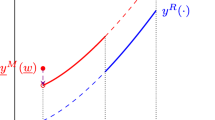Abstract
We construct an equilibrium model of party competition, in which parties are especially concerned with their core and swing voters, concerns which political scientists have focused upon in their attempts to understand party behavior in general elections. Parties compete on an inifinite-dimensional space of possible income-tax policies. A policy is a function that maps pre-fisc income into post-fisc income. Only a fraction of each voter type will vote for each party, perhaps because of issues not modeled here or voter misperceptions of policies. Each party’s policy makers comprise two factions, one concerned with maximizing the welfare of its constituency, or its core, and the other with winning over swing voters. An equilibrium is a pair of parties (endogenously determined), and a pair of policies, one for each party, in which no deviation to another policy will be assented to both its core and swing factions. We characterize the equilibria: they have the property that both parties propose identical treatment of a possibly large interval of middle-income voters, while the “left” party gives more to the poor and the “right” party more to the rich. An empirical section uses the data of Piketty and Saez on taxation in the US to assess the model’s predictions. We argue that the model is roughly confirmed.
Similar content being viewed by others
References
Austen-Smith D (2000) Redistributing income under proportional representation. J Political Econ 108: 1235–1269
Besley T, Coate S (1997) An economic model of representative democracy. Q J Econ 112: 85–114
Brownlee WE (2004) Federal taxation in America: a short history. Cambridge University Press, New York
Carbonell-Nicolau O, Ok E (2007) Voting over income taxation. J Econ Theory 134: 249–286
Cox G (2006) Swing voters, core voters and distributive politics. Working paper, http://www.yale.edu/polisci/info/conferences/Representation/papers/Cox.pdf
Current Population Survey (2006) Annual Demographic survey: march supplement. http://pubdb3.census.gov/macro/032006/rdcall/1_001.htm
Dixit A, Londregan J (1998) Ideoglogy, tactics, and efficiency in redistributive politics. Q J Econ 113: 497–529
Levy G (2004) A model of political parties. J Econ Theory 115: 250–277
Lindbeck A, Weibull J (1987) Balanced-budget redistribution as the outcome of political competition. Public Choice 52: 273–297
McCarty N, Poole K, Rosenthal H (2006) Polarized America. MIT Press, Cambridge, MA
Osborne M, Slivinski A (1996) A model of political competition with citizen–candidates. Q J Econ 111: 65–96
Piketty T, Saez E (2006) How progressive is the US federal tax system? An historical and international perspective. http://elsa.berkeley.edu/~saez/piketty-saezNBER06taxprog.pdf (Published in J Econ Perspect 21:3–24 2007, but without the data appendices)
Riker W (1982) Liberalism against populism: a confrontation between the theory of democracy and the theory of social choice. WH Freeman, San Francisco, CA
Roemer JE (1999) The democratic political economy of progressive income taxation. Econometrica 67: 1–19
Roemer JE (2001) Political competition. Harvard University Press, Cambridge, MA
Roemer JE (2006) Democracy, education and equality. Cambridge University Press, New York
Roemer JE (2009) A problem in conceptualizing party competition over redistributive taxation. In: Aragonès E, Beviá C, Llavador H, Schofield N. (eds) The political economy of democracy, Chap 15. Fundación BBVA, Bilbao, Spain, pp 259–266
Schumpeter J (1954 [1918]) The crisis of the tax state. In: Peacock A (ed) International economic papers: translations prepared for the International Economic Association, no 4. Macmillan, London, pp 5–38
Author information
Authors and Affiliations
Corresponding author
Rights and permissions
About this article
Cite this article
Roemer, J.E. A theory of income taxation where politicians focus upon core and swing voters. Soc Choice Welf 36, 383–421 (2011). https://doi.org/10.1007/s00355-010-0514-1
Published:
Issue Date:
DOI: https://doi.org/10.1007/s00355-010-0514-1




